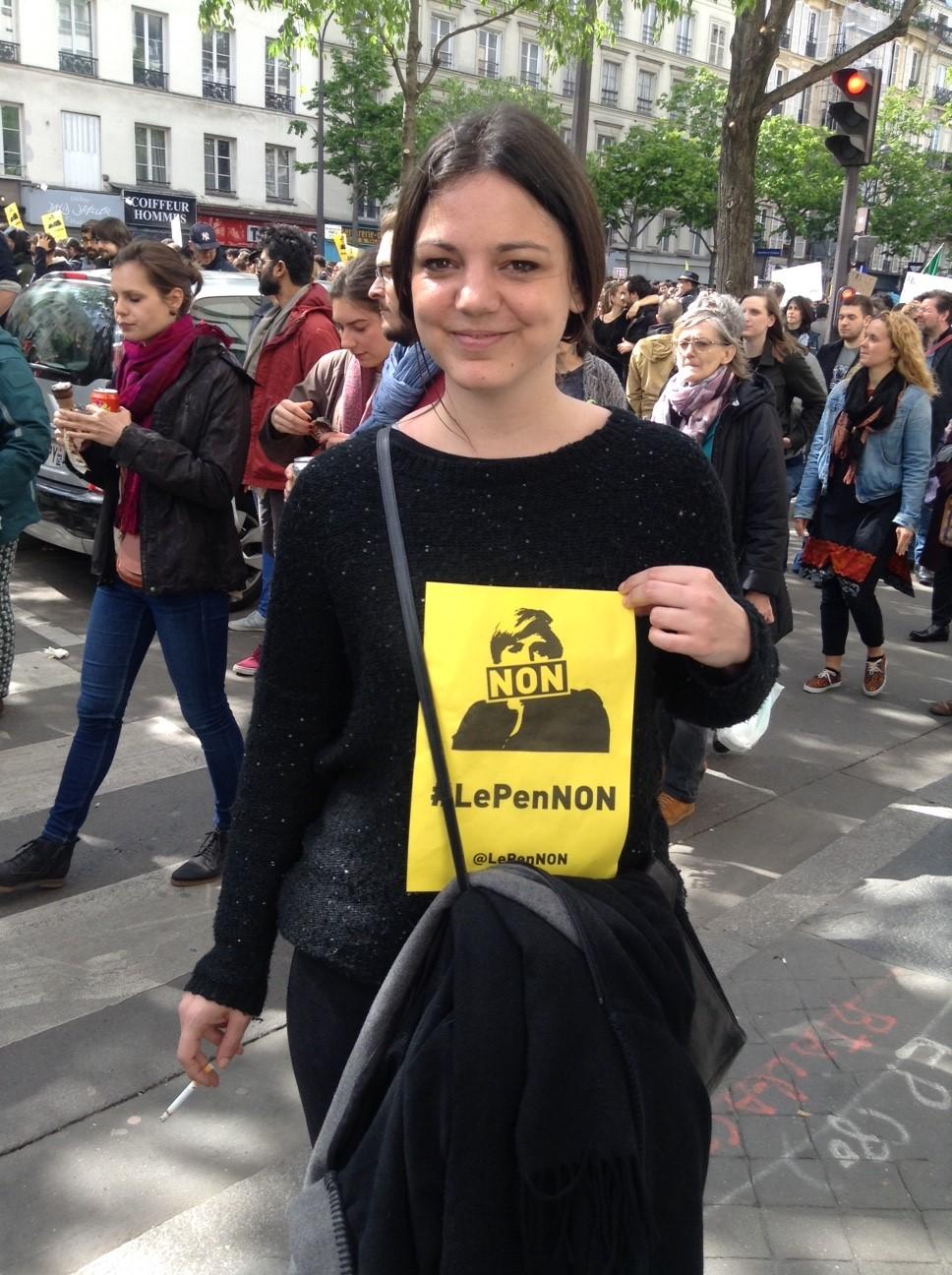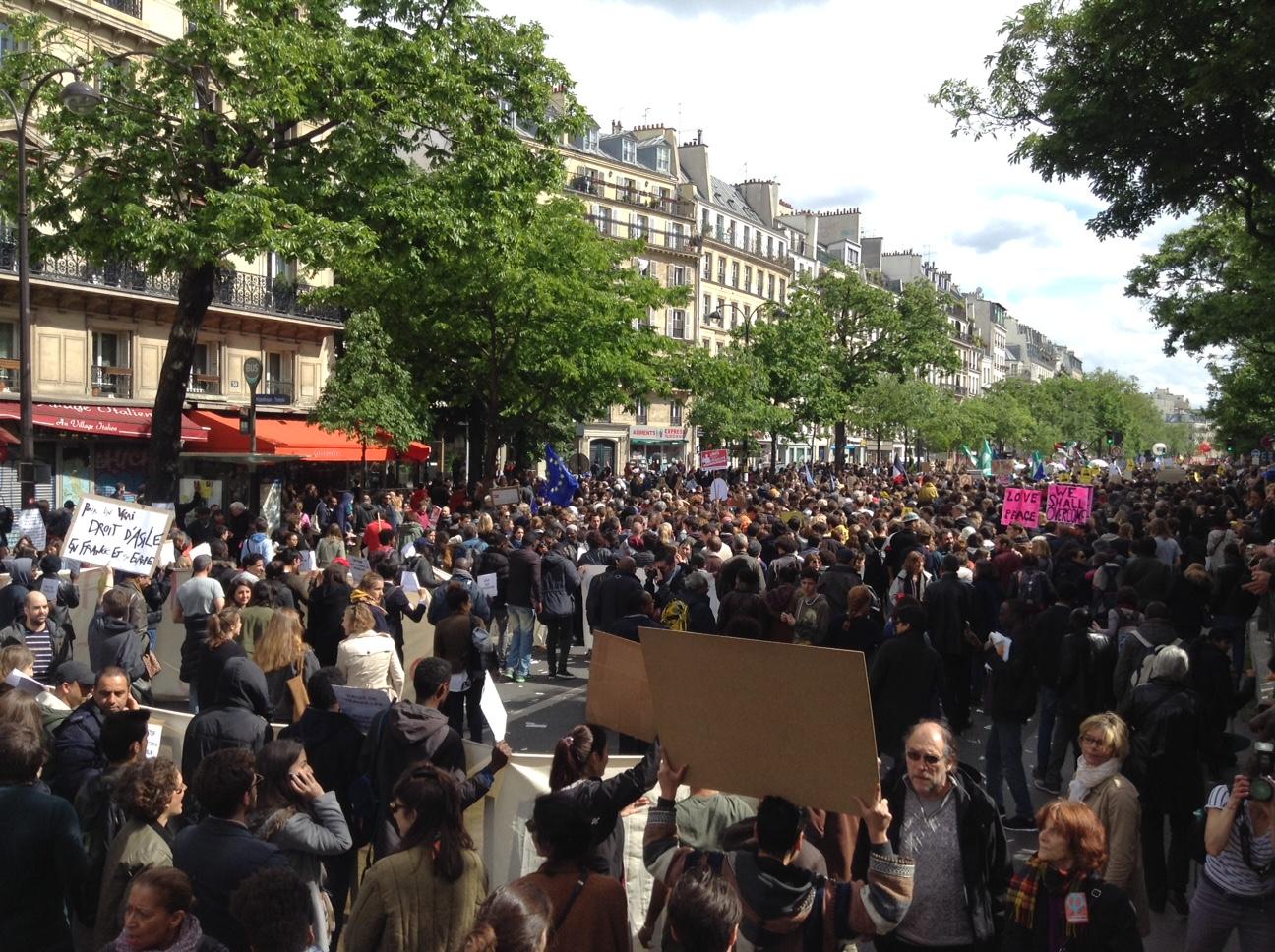May Day holiday in Paris turns into a political battleground
A massive May 1st rally against Marine Le Pen began on place de la République in Paris.
May 1 is France’s Labor Day, usually a festive day for union workers, a day of social engagement and rallies all over France. It always intensifies during election years, when the celebration sits between the two voting rounds. And this year is no exception.
Just days from the second round of this unusual presidential election run, Paris and France became a battleground of symbolisms.
On this day, the old guard of the far right National Front party traditionally worships its medieval icon of pure French identity, Joan of Arc, who according to the story, heard a divine call prompting her to raise an army and drive the English invaders out of France. This morning, Jean-Marie Le Pen (father of party presidential hopeful Marine Le Pen), honorary president of the party, placed flowers at the foot of the statue of Joan of Arc in Paris near the Louvre museum.
But the rally was poorly attended, only about 300 supporters showed up and saw an elderly Le Pen climb up to the podium with difficulty, having trouble articulating his speech. For some reason, microphones were turned off, but he kept going even though no one could hear him, offering a somewhat obsolete and irrelevant image of the far right party’s old guard.
By contrast, the party’s new generation, headed by daughter Marine Le Pen, held a very large rally on the outskirts of Paris with thousands of supporters, far removed from the statue and the symbolism of Joan of Arc. Marine Le Pen has done everything she could since the beginning of her run to break with her father’s traditionally racist, anti-Semitic, anti-immigrant and intolerant party.
She ran under her first name only, Marine, to break with the Le Pen line and gave up her party’s presidency temporarily last week to stand as a free candidate. Last Saturday, in a dramatic turn of events, she gained the support of failed presidential candidate Nicolas Dupont-Aignan. She promptly announced that if elected, she’d appoint him prime minister. Dupont-Aignan managed to obtain some concessions from Marine Le Pen’s program, including modifying her position on returning France’s currency from the Euro to the Franc, among other things.
This alliance allowed the far-right candidate to undergo a metamorphosis, one that moves her a few notches closer to the conservative right’s position and perhaps gain votes from supporters of main Conservative candidate François Fillon, who lost his bid last week.
This mainstreaming of the far right is a first in the history of the National Front. It may have consecrated the far right as a bona fide French party with a strong mandate, and it will become an important opposition movement if Marine Le Pen is not elected.

While Marine Le Pen was mocking centrist Emmanuel Macron as “a clone” of socialist president François Hollande, calling Macron an arrogant, anti-patriot, limousine-liberal banker, Macron attended a May 1 ceremony by the Carrousel bridge in Paris.
The event commemorates the 1995 murder of Brahim Bouarram, a 29-year-old Moroccan man who was pushed into the Seine by National Front supporters at a Joan of Arc rally, and drowned. For Macron, showing up there was an attempt to make a point about the National Front’s dark past.
This week, Macron called Marine Le Pen the candidate of hatred and the true heiress of her father, party and their ideas.
At his own rally, Macron railed against Dupont-Aignan’s siding with the National Front. “He had already lost his election bid,” he said, “and now he has lost his honor.”
At the Place de la République, tens of thousands of people gathered and marched down the streets. There was a party atmosphere with music, beverages and barbecues. Most people there came for a show of unity against Marine Le Pen and the far right.
Djamila, a 57-year-old French nursing assistant of Algerian descent, said she voted for the far left candidate Jean Luc Mélenchon in the first round, but is happy to vote for Macron this round.
“Us Muslims,” she says, “we are going to vote for Macron to save France. Islam has been insulted by other candidates like [François] Fillon and Le Pen who have insulted the Quran and talk about Islamo-fascism, so that’s enough.”
But many are calling for a boycott of the election because they feel neither candidate holds French people’s interest at heart. Jérôme Métellus, a teacher in Paris attended the anti-Le Pen rally but said he can’t be bothered to vote for either one.
“Both candidates belong to the same class,” he said, “the bourgeois. Macron threatens social security and the social progress achieved over decades. The difference is that Le Pen is running as the anti-system candidate, just like Donald Trump, But she’s the same as Macron.”
Métellus is a member of a far left party, but there are many voters closer to the center who, like him, say they are tired of being held hostage to the far right candidate at each presidential election, which forces them to vote for someone they don’t want, and they just won’t do it anymore. It’s expected that there will be a high rate of abstention in this election.
It’s too early to say whether Marine Le Pen’s alliance with conservative Dupont-Aignan and her break from the cult to Joan of Arc will be enough to help her win the election. Macron is still ahead of Le Pen in the polls but has gone down slightly over the past few days. In any case, for this French presidential election as well as for the last American one, it is clear anything could change in an instant.
Every day, reporters and producers at The World are hard at work bringing you human-centered news from across the globe. But we can’t do it without you. We need your support to ensure we can continue this work for another year.
Make a gift today, and you’ll help us unlock a matching gift of $67,000!
